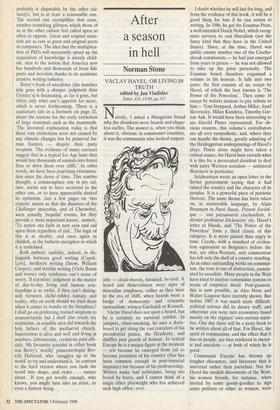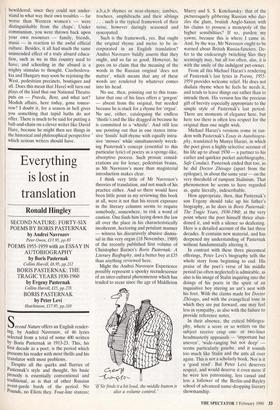After a season in hell
Norman Stone
VACLAV HAVEL, OR LIVING IN TRUTH edited by Jan Vladislav
Faber, £15, £4.99 pp.3I5
Naively, I asked a Hungarian friend why the dissidents wore beards and shape- less outfits. The answer is, when you think about it, obvious: in communist countries, it was the communists who looked respect-
able — clean-shaven, besuited, be-tied. A beard and dishevelment were signs of masculine toughness, rather as they were in the era of 1848, when beards were a badge of democratic and romantic nationalism: witness Garibaldi or Kossuth.
Vaclav Havel does not sport a beard, but he is certainly no sartorial exhibit. In jumpers, chain-smoking, he uses a skate- board to get along the vast corridors of his presidential palace, the Hradcany, and shuffles past guards of honour. In central Europe he is a unique figure at the moment — not because he emerged from jail to become president of his country (that has been common enough in post-imperial impasses) but because of his professorship. Writers make bad politicians, being too bored by bores, and I cannot think of a single other playwright who has achieved such high office, ever.
I doubt whether he will last for long, and from the evidence of this book, it will be a good thing for him if he can return to writing. In 1986, he got the Erasmus Prize, a well-intended Dutch Nobel, which recog- nises services to real liberalism (not the fancy kind that they have in the United States). Since, at the time, Havel was public enemy number one of the Czecho- slovak communists — he had just emerged from years in prison — he was not allowed to take up the prize personally. The Erasmus board therefore organised a volume in his honour. It falls into two parts: the first consists of six essays by Havel, of which the best known is 'The Power of the Powerless'. Then come 16 essays by writers anxious to pay tribute to him —Tom Stoppard, Arthur Miller, Josef Skvorecky, Milan Kundera, Timothy Gar- ton Ash. It would have been interesting to see Harold Pinter represented. For ob- vious reasons, this volume's contributors are all very sympathetic, and, where they can handle the theme, greatly admiring of the Heideggerian underpinnings of Havel's plays. Pinter alone might have taken a critical stance, for Havel here records what it is like for a persecuted dissident to deal with naive Western socialists — unilateral disarmers in particular.
Solzhenitsyn wrote an open letter to the Soviet government saying that it had ruined the country and the character of its peoples. It is a powerful piece of patriotic rhetoric. The same theme has been taken on, in memorable language, by Alain Besancon in Passé Russe, Present Sovieti-
que 'une paysannerie clochardisee, le dernier proletariat Dickensien' etc. Havel's letter to Husak, and 'The Power of the Powerless' form a third classic of this category. It is more pained than angry in tone: Czechs, with a standard of civilisa- tion equivalent to Belgium's before the war, are ultra-Western, and communism has left only the shell of a country standing. As in other outstanding works on commun- ism, the tone is one of abstraction, punctu- ated by anecdote. Many people in the West have tried to analyse communist systems in terms of empirical detail. Post-glasnost, this is now possible, as Alec Nove and Walter Laqueur have recently shown. But before 1987 it was much more difficult: political science did its dreary stuff, and otherwise you were into economics based mainly on the regimes' own curious statis- tics. One day there will be a nasty book to be written about all of that. For Havel, the spirit of communism, and the effect that it has on people, are best rendered in rhetor- ic and anecdote — at both of which he is good.
Communist Europe has thrown up tougher characters, and literature that is universal rather than parochial. Not for Havel the modish discontents of the West; his women friends, for instance, when invited by some goody-goodies to sign some petition or other as women, were bewildered, since they could not under- stand in what way their own troubles — far worse than Western women's — were distinguishable from the chaps'. Under communism, you were thrown back upon your own resources — family, friends, music — in reaction to the awful official culture. Besides, it all had much the same unintended effect of a truly absurd educa- tion, such as we in this country used to have; and schooling in the absurd is a mighty stimulus to thought. Czechoslova- kia and Hungary may soon be rejoining the West, pedestrian precincts, boutiques and all. Does this mean that Havel will turn out plays of the kind that our National Theatre puts on — Pravda, Bent, and what not? Modish affairs, here today, gone tomor- row? I doubt it, for a season in hell gives you something that tepid baths do not offer. There is much to be said for putting a ball-and-chain on a clever writer like David Hare, because he might then see things in the historical and philosophical perspective which serious writers should have.



















































 Previous page
Previous page